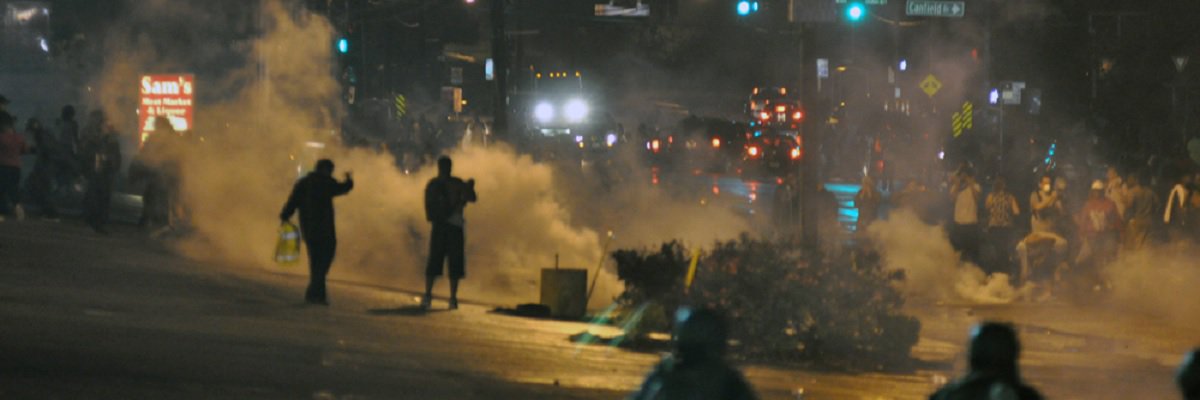In this Week’s FOIA Roundup, documents show the Department of Homeland Security officials’ baseless concern that Black Lives Matter activists would join ISIS following Ferguson protests, Pentagon damage assessments on the 2012 WikiLeaks revelations spurred by Chelsea Manning are finally available after FOIA lawsuit and a public records request from Carbondale, Illinois undermines the mayor’s account of domestic disturbance.
See a great use of public records we missed? Send over your favorite FOIA stories via email, on Twitter, or on Facebook, and maybe we’ll include them in the next round-up. And if you’d like even more inspiration, read past round-ups.
DHS officials feared that black activists fighting against police brutality would join ISIS
Intelligence reports and internal communications obtained through a FOIA request by government transparency group Property of the People show DHS officials voicing concerns that largely black activists who protested in the wake of the shooting of Michael Brown in Ferguson, Missouri in 2015 would join ISIS.
The newly released documents, published in an article in The Intercept, highlight the racism and bias inherent in federal security agencies’ perspective on the movement for black lives, which began in earnest after Brown’s murder in 2015. The only evidence offered for this connection was obtained through social media surveillance, which yielded a few results for “presumed” U.S. citizens calling on oppressed communities to “attack ‘Anglo-American supremacists’” in relation to the injustices highlighted by the Ferguson protests.
And in 2016, after the killing of five police officers in Dallas, Texas during an anti-police brutality protest, the Office of the Director of National Security issued a memo warning of online calls from a Bangladeshi Al-Qaeda supporter for Black Americans to mimic the Dallas attacker and continue targeting American law enforcement. The memo failed to make any connection from the poster to Black Lives Matter protesters.
Omar Farah, a senior staff attorney at the Center for Constitutional Rights, told The Intercept that the false connection is indicative of the racist bias against both Black Americans and Muslims that pervades the U.S. law enforcement and national security communities.
“Blackness and Muslim identity have been cast as threatening since America’s founding,” she said. “No surprise, then, that these documents reveal near obsessive fear of their intersection.”
Read more here.
2012 Wikileaks damage assessments finally released thanks to a FOIA lawsuit filed by BuzzFeed News
As Chelsea Manning continues to sit in prison for refusing to testify before a grand jury, a FOIA lawsuit filed by Jason Leopold at BuzzFeed News has led to the release of “damage assessment reports” compiled by the Defense Intelligence Agency in the wake of the revelations published by WikiLeaks in 2012.
The highly-redacted reports detail the departments’ concerns over compromised intelligence and information released by WikiLeaks even before Manning’s whistleblowing. One powerpoint from 2011, titled “WikiLeaks Permanently Changes the Disclosure Game,” highlighted government concerns that the transparency organization’s work was largely regarded as positive by Americans.
The reports also detail fears that information compromising intelligence workers’ identities would lead to “an increase in intimidation and/or assassination,” and that revelations about U.S.-led Coalition Forces’ strategies in Iraq and Afghanistan would prompt insurgents to adapt their own techniques.
Read more here.
Police records contradict Carbondale Mayor’s account of domestic disturbance
A public records request out of Carbondale, Illinois has cast doubt on the account given by the city’s mayor of a domestic disturbance at his home which police responded to on March 31st.
According to The Southern Illinoisan, Mayor John “Mike” Henry issued a public statement claiming that “(t)here was never any violence, or threat of violence” as part of the disturbance. But police reports obtained through an Illinois Freedom of Information Act request tell a different story.
Southern Illinois University Carbondale Police Officer Anthony Stein, who responded to the disturbance and issued the report, wrote that Mayor Henry has scratches on his chest and a bite mark on his hand. His wife Terri, according to the records, had blood on her clothing and “reported being struck” after “some kind of struggle over a cell phone.”
No arrests were made due to “lack of evidence” and inconsistencies in the accounts of Henry and his wife.
Read more here.
Read a great FOIA-based news story we should highlight? Let us know and maybe we can include it in our next roundup! Send it over via email, on Twitter, or on Facebook.
Image by Loavesofbread via Wikimedia Commons and is licensed under CC BY-SA 4.0




